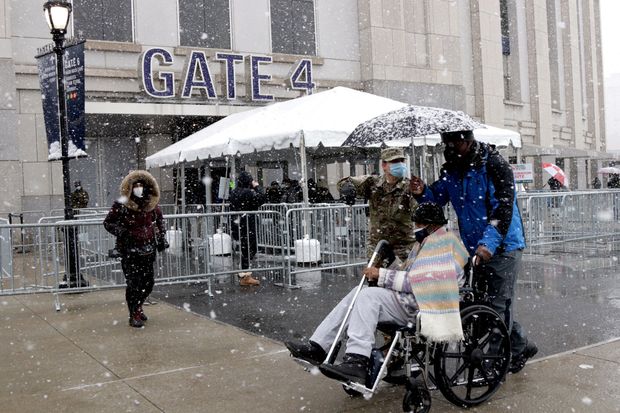Newly reported coronavirus cases in the U.S. fell below 100,000 for the first time this year, and hospitalizations continued to decline, as vaccination rollouts picked up speed.
The U.S. reported just under 87,000 new coronavirus cases for Sunday, according to data compiled by Johns Hopkins University and published early Monday.
The data may update later. Overall, more than 27 million people in the U.S. have tested positive for Covid-19 since the pandemic began, accounting for more than a quarter of all confirmed cases world-wide, according to Johns Hopkins data.
Hospitalizations because of Covid-19 fell to 81,439 as of Sunday, marking the 26th consecutive daily decline, according to the Covid Tracking Project.
The number of Covid-19 patients requiring treatment in intensive care units also fell.
As of Sunday, there were 16,616 Covid-19 patients in ICUs across the country, the lowest level since Nov. 19, according to the Covid Tracking Project.
The U.S. also reported its lowest daily death toll from the disease since the beginning of the year.
The country added more than 1,200 fatalities to the death toll, bringing the total to more than 463,000, according to Johns Hopkins.
While supplies of Covid-19 vaccines are still limited, states are ramping up vaccinations. About 9.5% of the U.S. population has been given at least one dose.
The rates vary from state to state, from roughly 6% of the population in Alabama to more than 12% in Alaska, according to data from Centers for Disease Control and Prevention.
There were an average of 1.1 million doses administered daily in the U.S. for the week ending Feb. 6.
That is more than double the average of 433,000 daily a month earlier.
Meanwhile, a highly transmissible variant of the coronavirus is spreading rapidly in the U.S., with the number of Covid-19 cases caused by it doubling every week and a half, according to a study posted online Sunday.
The research, conducted by a group of academic and industry scientists, was posted on a preprint server and hasn't been peer reviewed or published in a scientific journal.
But it essentially confirms a forecast published last month by the CDC that found that the variant, known as B.1.1.7, would overtake other strains of the coronavirus by mid to late March unless strong public health measures are taken to slow its spread and enable a vaccination program to roll out more widely.
Latest Stories
-
Awakening to God Principles series: The great awakening
2 minutes -
The absurd inequality of climate work: Overcoming dilemmas in the green transition
14 minutes -
ORAL team receives first dossier of ¢500m National Service ghost names scandal
25 minutes -
AfroFuture’s Culture Beach Jam comes off Dec. 28 & 29
28 minutes -
NDC gov’t to address first quarter expenditure after January 7 – Ato Forson to Ghanaians
40 minutes -
Man sentenced to 5 years for vandalism at Parliament
1 hour -
Art for development: Isaac Koney tells his story
1 hour -
“I prayed for it” – Lady appreciates Joy Prime, Peace Bridals for free wedding gown
2 hours -
CEO Network Ghana pay courtesy call on Mahama
2 hours -
Lady Rhoda features Minister Igwe on new single ‘Thank You’
2 hours -
Labadi Beach Hotel secures court injunction against Polo Beach Club
2 hours -
Vezsel Music releases debut single ‘Asa Papa’ off upcoming ‘Joy In The Morning’ EP
2 hours -
National Security Task Force assures EC of security to continue re-collation
3 hours -
We are ready for “24 Hour Economy” policy provided there is the needed incentives – business associations
3 hours -
K-pop continues to rise on Nigerian music charts
3 hours

